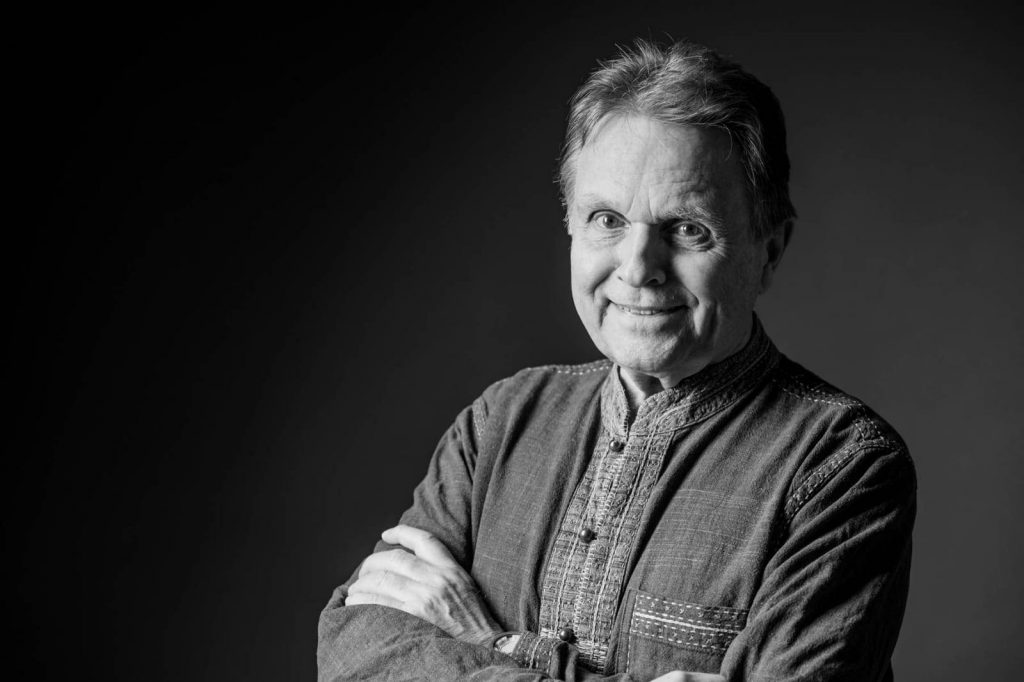Initiator and key player in the establishment and further development of Ina gGmbH
In memory of
Prof Dr Jürgen Zimmer

President of INA gGmbH from 1996–2017
Obituary
The following obituary was published on the website of the Internationale Akademie Berlin gGmbH in August 2019.
On 21 August 2019, Professor Dr Jürgen Zimmer died of a stroke at the age of 81 at one of his most important places of work in recent years in Chiang Mai, Thailand. His death came as a great shock to us all. He was buried there on 28 August 2019 in the presence of his family, his wife Birzana, his children and his self-chosen extended family, the children and adults of the School for Life he founded.
Jürgen Zimmer was an extraordinary personality with a very eventful biography.
After studying psychology, he initially worked as a research assistant at the Max Planck Institute for Human Development in the 1960s with the leading professors Hellmut Becker and Shaul B. Robinsohn. Together with them, he developed theories of curriculum development for educational institutions that understood education as creative and productive learning for solving real life issues. Instead of understanding education solely as the reproductive acquisition of knowledge available in the adult, academically educated generation, he focussed on the innovative power of the next generation. A paradigm shift in educational research! In this view, children and young people, as well as their parents and neighbours, became the subjects of their own educational biographies – not objects to whom the 'right' knowledge had to be imparted by academically recognised authorities. The critical theories of the Frankfurt School – Adorno and Horkheimer – on coming to terms with German fascism and the liberation pedagogy of the Brazilian pedagogue and philosopher Paulo Freire – with his literacy campaign for oppressed agricultural workers – were key intellectual and political driving forces behind this paradigm shift.
As early as 1964, a teacher, Georg Picht, described the German education system as an educational catastrophe. After a few years of shock, politicians moved and in 1966 appointed the German Education Council, which was made up of representatives from politics, administration and science, including Jürgen Zimmer as an expert on the elementary sector. This Education Council came to the conclusion, among other things, that early education was of crucial importance for the educational biographies of children and young people. Kindergarten became the focus of educational policy and became a field of reform with many hopes and expectations.
Jürgen Zimmer seized the opportunity to apply his ideas of subject- and lifeworld-orientated curriculum development to this educational sector. In 1971, he became head of the newly founded working group on pre-school education at the German Youth Institute (DJI).
He and the staff of the Preschool Education Working Group at the DJI thus became successful and pioneering initiators of a fundamental innovation in the field of early childhood education and care that continues to have an impact today. Recognising children and their families as well as their extended reference groups as subjects and active creators of their living environments was the guiding principle. The fact that the principles of lifeworld-orientation, participation, integration and the responsibility of politics to promote a child- and family-friendly environment are defined today in the Child and Youth Welfare Act, SGB VIII, which was negotiated at length in the 1980s and 1990s, is not least the result of this commitment.
In the 1980s, Jürgen Zimmer shifted his focus to international work. In 1980, he was appointed to a chair in intercultural education at the Free University of Berlin. This opened up opportunities for him to organise study trips with students to other countries – initially to Turkey, one of the most important immigrant countries in Germany. This resulted in concepts and practice-orientated materials for work in daycare centres and schools in Germany. Germany soon became too boring for Jürgen Zimmer. He was drawn to Nicaragua, a country that was trying to free itself from a dictatorship at the time. Here he was the initiator of educational policy networks and a political advisor. It was here that he particularly recognised that education is always a question of community development. In 1983, he became Vice President and later President of the International Community Education Association (ICEA) and played a key role in establishing community schools and centres in Germany and internationally.
Since the mid-1990s, Jürgen Zimmer has been an initiator and key figure in the establishment and further development of the International Academy Berlin for Innovative Education, Psychology and Economics (INA gGmbH). His vision when founding the INA was to establish a research, training and practice development organisation that would contribute to meeting global issues and challenges with innovative concepts in a university's research and teaching that tended to be divided along disciplinary lines. He was instrumental in creating opportunities for people to work together who shared visions for the development of a democratic education system and who would not have found a place for this in the university structures. He was President of the International Academy from its foundation in 1996 until 2017.
In the 2000s, he increasingly shifted his activities to Thailand, where he founded the first School for Life – a school that opened up new opportunities for children and young people who had little or no access to education in Thailand to educate themselves and play an active role in the development of their societies.
Jürgen Zimmer certainly gave everyone who worked with him a great deal of inspiring impetus and repeatedly caused irritation. He was characterised by the fact that he was not afraid to actively approach people who came from backgrounds unknown to him and his established community. He brought people together who would never have met without him. This opened up valuable new experiences for those of us who took part. It also revealed differences that could not always be bridged, but were important for clarifying positions.
Jürgen Zimmer was a man with great visions. Working them down into feasible steps under the given circumstances was not his thing. He usually succeeded in winning over people who took on the endeavours of these levels for him.
Jürgen Zimmer and all his many contributors, generations of students, colleagues in projects and programmes, politicians who sought his advice and that of his contributors, colleagues from the academic world who argued with him, have certainly had an enormous influence on the development of a democratic educational landscape. This applies in particular to the diverse activities of the Institute for the Situational Approach in the INA and, above all, to the many daycare centres that have sharpened and further developed the situational approach co-founded by Jürgen Zimmer in their practice.
All of this will continue to live and work after his death.
Jürgen Zimmer is survived by his wife Birzana, five children and grandchildren.
We mourn with them.
Dr Christa Preissing, President of the International Academy Berlin (INA gGmbH), Dr Doris Klappenbach, Katrin Macha and Matthias Kracht (Vice Presidents), Monika Lentz (Managing Director), the shareholders and employees of INA gGmbH




